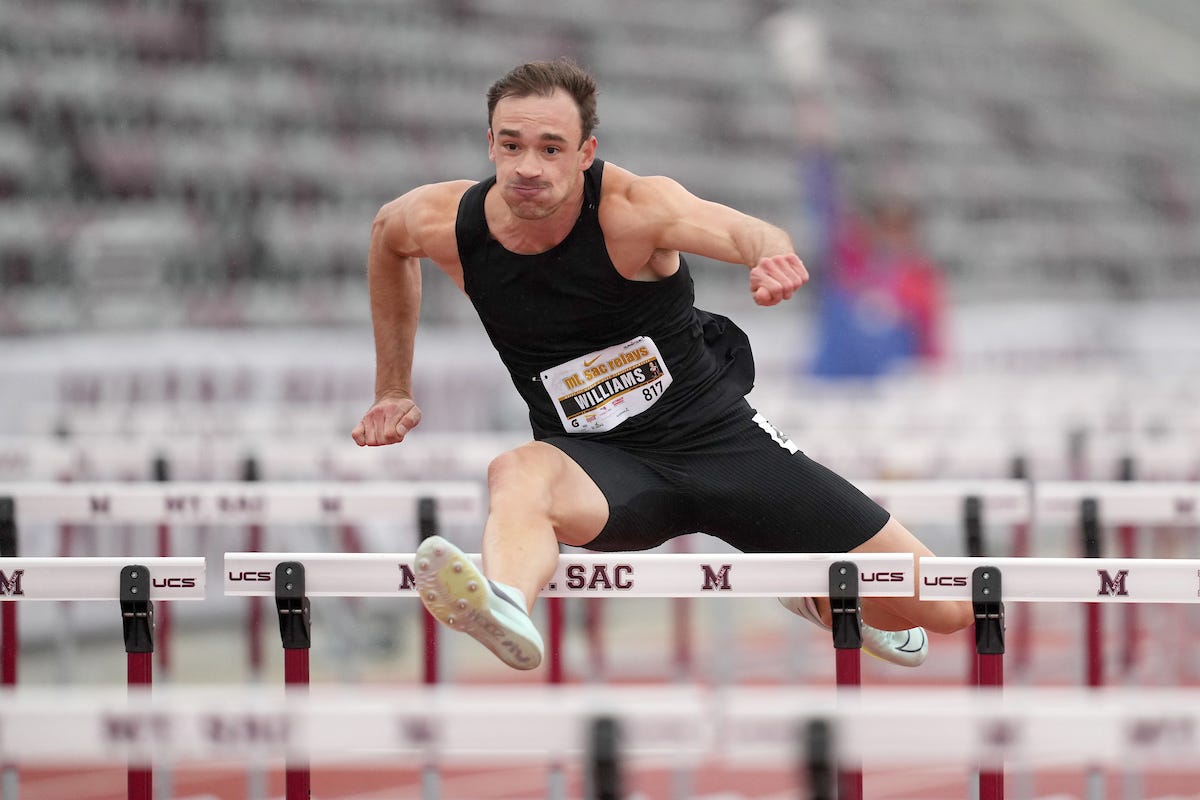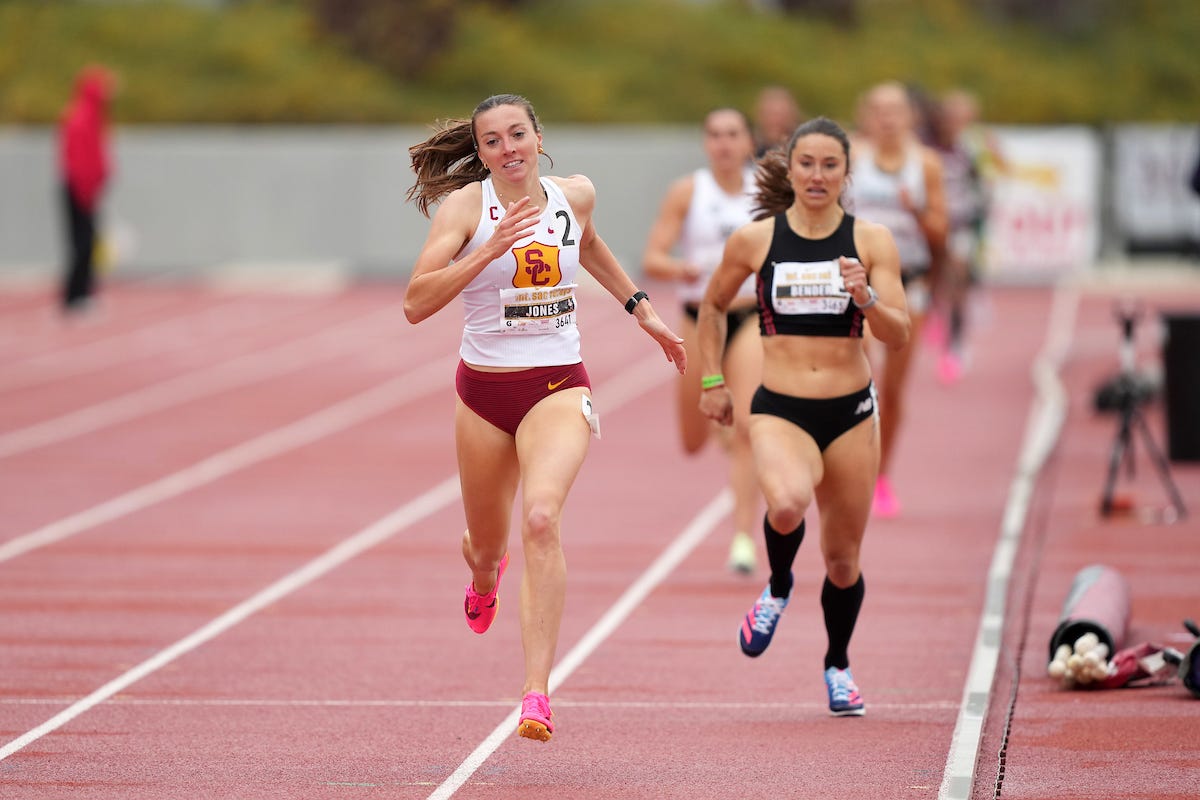A big score after a long layoff
Decathlete Williams posts yearly world-leading mark in Mt. SAC Relays after missing 2022 season while recovering from hip surgery

WALNUT, California – Harrison Williams says he’s used to flying under the radar during the first day of the decathlon. But his come-from-behind victory in the elite division of the Mt. San Antonio College Relays on Thursday was special for a variety of reasons.
First, his score of 8,492 points topped his personal best of 8,439 that he had set in 2021.
Second, it exceeded the qualifying standard of 8,460 points for the World Athletics Championships in Budapest, Hungary in August.
Third, it was the best score in the world this year.
Fourth, it moved him to 12th on the all-time U.S. performer list.
Fifth, and perhaps most impressively, he accomplished all of the above while competing in his first decathlon since he finished fourth in the U.S. Olympic Trials in 2021 after completely tearing the plantar fascia in his left foot during the pole vault portion of that competition and then undergoing extensive labrum surgery on his left hip in November of that year.
“I’m happy,” Williams said. “Its early in the season and to have your first decathlon after that big a recovery period and get a [personal record] and the standard, it means a lot.
”It’s been a long road so I’m happy to get though it heathy. Everything feels good, or at least as good as things can feel at the end of a decathlon.”
Heath Baldwin of Michigan State University finished second with 8,084 points, followed by Austin West of Iowa with 8,038.
Kyle Garland of the University of Georgia, who was in first place with 4,507 points after the first day on Wednesday, failed to clear a height in the pole vault and withdrew from the competition after that as he was suffering some muscle tightness and pain in the upper right side of his back.
Williams, 27, figured he was in good position after the first day of the decathlon on Wednesday as his total of 4,471 points was his highest ever and left him only 36 points behind Garland.
He lost 10 points to collegiate record-holder Garland in the first event on Thursday, when he ran 14.12 seconds in the 110-meter high hurdles to Garland’s 14.04. But he trimmed his deficit to four points after throwing the discus 45.85 meters (150 feet 5 inches) to Garland’s 43.79 (143-8).
Williams had thrown the discus three meters further while on the way to his previous best total in the decathlon. But he was proud of his performance because it was cool and raining while the discus was being contested.
The pole vault was the next event and though Williams was frustrated that he did not jump higher, his clearance of 5.00 (16-8¾) propelled into the lead as Garland failed to clear a height.
Now well clear of his closest remaining competitors in the standings, Williams threw the javelin 52.91 (173-7) before finishing second in the 1,500 — the final event of the decathlon — in a time of 4 minutes 31.38 seconds.
“The goal coming in was to get the standard and just get that off my shoulders and see where I am at in each event,” Williams said. “To see which events I need to work on. I was on pace for a really big score after day one, but the conditions were pretty rough for the first couple of events today, particularly in the discus.”
Although Williams felt like he left a lot of points on the table in the high hurdles, pole vault, and javelin, he was still very pleased with his performance.
“If I could have put together a big second day, I think I could have gone 86 or 87-hundred points,” he said. “But it’s early in the season and there’s plenty of room for improvement.”
Allie Jones of USC expressed similar sentiments after winning the heptathlon with a 6,217-point total that obliterated her previous best of 5,832 that she posted while finishing second at Mt. SAC last year.
“Nothing I did was great, except perhaps in the long jump, where I [set a personal record],” she said after moving to 11th on the all-time collegiate performer list in the heptathlon. “There was a lot of room for improvement in the other events.”

After totaling 3,779 points in the first four events on Wednesday, Jones was locked in a tight competition with fellow Americans Chari Hawkins (3,756) and Annie Kunze (3,727), as well as with Norwegian Ida Eiking of the University of Washington (3,709) to start the day Thursday.
However she gave herself some breathing room when she leaped a wind-aided 6.23 (20-5¾) in the long jump to pick up 105 points on Eikeng — who leaped 5.89 (19-4) — 117 on Hawkins (5.85, 19-2½), and 168 on Kunz (5.68, 18-7¾).
The next event was the javelin, which is Jones’ weakest and a strength of Eikeng. The end result was that Eikeng picked up a whopping 409 points on Jones when she posted a best of 52.29 (171-6) to Jones’ 36.25 (118-11).
That massive point swing left Eikeng with a 134-point advantage over Jones entering the 800. But Jones’ 2:13.03 clocking in that event — the best of the competition — was more than 18 seconds faster than Eikeng’s 2:31.82 and helped her pick up 251 points on her Pac 12 Conference rival.
Eikeng totaled 6,100 points in second place, followed by third-place Beatrice Juskeviciute of Vanderbilt and Lithuania with 6,073.
“I knew I had this kind of multi-event in me,” grad student Jones said when asked if he was surprised by how much she raised her best. “But I never put it all together. It seemed like I always tanked one or two events and that would prevent me from putting together a good score.”
Haftu Knight of the University of Texas and Geordie Beamish of New Zealand won the elite races of the men’s 10,000 and 3,000-meter steeplechase, respectively, during the distance carnival on Thursday night.
Knight broke away from the lead pack with four laps left and ran his final 1,600 in 4:29.02 to win the 10,000 in 28:32.53. Mario Pacay of Guatemala finished second in 28:36.19.
Beamish won the steeplechase in 8:42.56 after waiting until the final 20 meters to launch a late spurt that defeated Pedro Garcia-Palencia of the University of Eastern Kentucky and Spain by a hundredth of a second.
WuGa He of China won the elite race of the women’s 10,000 meters in 32:25.35 after breaking away from countrywoman XiuZhen Ma just after the midway point of the race.
Lindsay Cunningham of Winona State University finished second in 32:43.64, followed by Ma in 33:07.47.
Stevie Lawrence of Great Britain won the elite division of the women’s steeplechase in 10:03.95 after breaking clear of her closest competitors with 1,200 meters left in the race. Katja Pattis of the University of Idaho and Italy finished second in 10:05.31.



